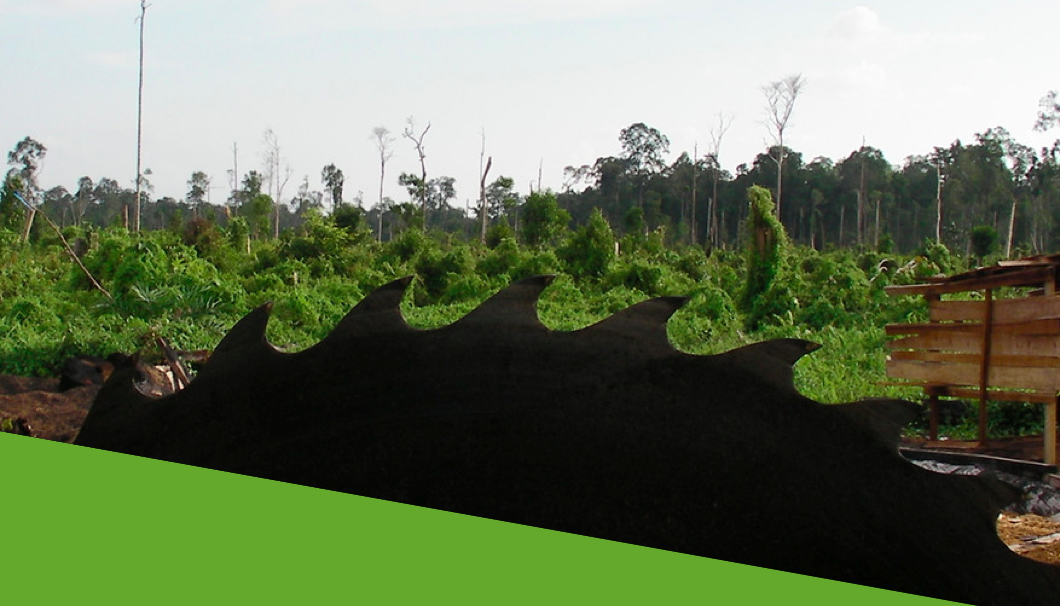On-the-ground interviews with 17 affected Indonesian communities reveal policy implementation problems while hundreds of unresolved land conflicts remain
Nearly two years after Asia Pulp and Paper (APP) made groundbreaking commitments to transform its notoriously destructive business practices, Rainforest Action Network (RAN) has partnered with one international and nine local Indonesian allies to produce a report that documents the company’s performance in meeting its social responsibility promises. Recent on-the-ground research in 17 Indonesian communities affected by APP reveal significant APP policy implementation problems, and hundreds of unresolved land conflicts remaining in APP’s concessions.
APP’s OKI Mill, one of the largest mills in the world, under construction before community Free, Prior and Informed Consent obtained:
Asia Pulp and Paper is recognized as one of the world’s foremost forest destroyers due to its 30-year legacy of egregious social and environmental impacts resulting from its insatiable acquisition of land and conversion of diverse rainforests to monoculture pulp plantations across Indonesia.
Following decades of public campaigning by RAN and allies, widespread community opposition and pressure from its customers and investors, in February 2013 APP announced a much-welcomed new Forest Conservation Policy. The policy sets out the companies commitments to reform its forestry practices and to address its long history of land grabs and human rights violations, climate pollution, deforestation, and wildlife habitat destruction across its 2.6 million hectares of concessions.
Our study is a contribution to ongoing independent monitoring of the company’s performance. The study was submitted as input into an evaluation of APP’s progress against its Forest Conservation Policy commitments being conducted by the Rainforest Alliance.
The community based research at the core of this report were part of a field based survey to investigate Asia Pulp and Paper’s (APP) performance, provide input into the evaluation of APP’s progress on fulfilling its social responsibility commitments, and recommendations to the company. The study finds little on-the-ground evidence to date that APP is taking sufficient action to resolve land conflict issues.
With the exception of progress in two communities where it is piloting conflict resolution approaches, there has been little change for communities embroiled in land disputes with the company. Hundreds of land conflicts remain and APP has been failing to involve affected communities in giving free, prior and informed consent to new projects or involving affected communities and other key stakeholders in the identification, analysis and resolution of land conflicts. Given how far the company still has to go to demonstrate and verify that satisfactory changes and remedies are happening on the ground, it’s still too soon for pulp and paper customers or investors to resume business with APP. The study suggests that potential business partners must scrutinize APP’s performance and require demonstrable and independently verified social and environmental outcomes from the company as a prior condition of business.
The study, which was initiated by a coalition of 11 Indonesian and International NGOs and community-based organizations, conducted interviews with village leaders and community members from 17 communities impacted by APP and its affiliates. Communities were visited in the Indonesian provinces of Riau, Jambi, South Sumatra, West Kalimantan and East Kalimantan between May and September 2014.
Commenting on the coalition’s findings, Patrick Anderson from Forest Peoples Programme said:
“APP still has a tremendous amount of work to do before we can say that their commitments are yielding satisfactory remedies to conflicts on the ground. We’re very concerned that at least one of the the two land conflict agreements that have been reached did not follow all the requirements in APP’s policy on respecting community rights and that there are many hundreds of conflicts with communities remaining to be resolved. Currently APP is failing to effectively involve communities and other key stakeholders in developing action plans and efforts to scale up its conflict resolution. If the situation doesn’t change, we’re concerned that the company’s efforts will not secure durable and equitable agreements needed at scale.”
Aidil Fitri, campaign director at Wahana Bumi Hijau stated that “our research on APP’s implementation of its Free, Prior and Informed Consent (FPIC) commitment relating to the new Oki Pulp Mill, one of the world’s largest, finds that the company has not gotten FPIC from at least one rights holding community and that the company has started construction of Oki Pulp Mill before the FPIC process was completed. We see this as a clear violation of FPIC and the company’s own policy.”
“If APP wants to regain the trust and business of customers and investors, it must improve transparency, work more effectively with stakeholders and prove that it has sufficiently implemented its commitments to the point where it can demonstrate widespread and positive impacts on the ground,” said Lafcadio Cortesi of Rainforest Action Network. “Because the company’s implementation is still at an early stage there is a clear need for continued independent monitoring and verification of the company’s performance. In order for APP to scale up the resolution of land conflicts and prevent further deforestation in the remaining natural forests in their concessions, the company will need to give back more of the land it is currently using for pulp wood plantations to meet community livelihood needs and land claims.”
“Our report provides detailed recommendations for how APP can address current problems and how it can ensure that the foundation that it has established leads to positive outcomes for communities and forests and delivers the results APP has promised. The study suggests to buyers and others that it’s still too soon to tell whether APP’s promises will become a reality,” Cortesi said.
The full report, available to download here, includes a table outlining the research findings from each community, and the executive summary and recommendations, available to download here, provides an overview of the full report’s findings and detailed recommendations of improvements APP can make.
